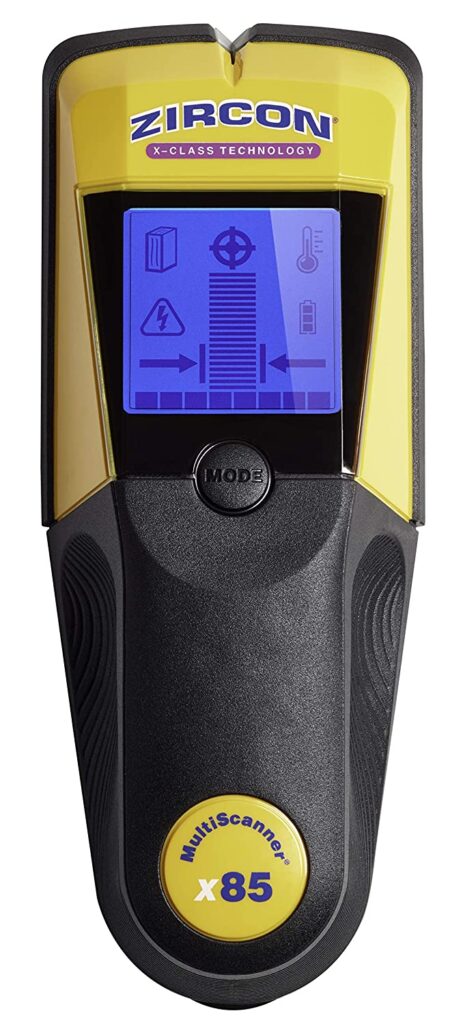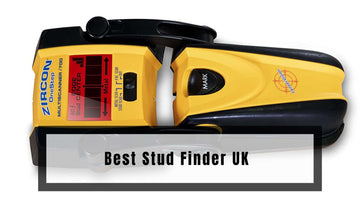
I recently ran into an electrical wiring issue. With Christmas around the corner, I decided to get some professional help. Interestingly enough, it was a hidden switchboard issue. The electrician had to find the switchboard that was covered up by a wall of plaster. Obviously, I couldn't afford to break the wall down.
So, the electrician took out this interesting device called a stud finder and eventually got to fix this issue. Check out our list of the Best Stud Finder UK.
Stud finders are amazing gadgets that scan the wall for studs and wires and shows you the exact location, giving you the confidence to drill away. This helps prevent a massive undertaking like a renovation.
Related: Check out our list of the Bathroom Sealant Tape UK!
Now although there are a ton of stud finders, not all are worth it. I scoured Amazon UK with my team and compiled a list of the Best Stud Finder UK.
Stud Finders -- Quick Summary
| 9 Top Stud finders | Best Feature |
| Bosch GMS120 | 4 LEDs to detect the proximity |
| Travool Sensor Wall Scanner Electronic Stud Finder | 2 modes of detection that also detects live running wires |
| Proster Stud Finder 4 in 1 | Can detect both wood and metal |
| Tacklife DMS05 4 in 1 Wall Detector | Upto 120mm depth finder |
| Franklin Sensor Wall Stud Finder | Scans 13 locations at once |
| Zircon Multiscanner i520 | Flash light system to indicate the presence of beam |
| Bosch Professional Wall Scanner D-tect 150 | Uses radar sensor for detection |
| Zircon i700 Multiscanner | LED backlight display to view results |
| Folai Stud Finder | Live wire warning indicator |
After reviewing 100 stud finders based on various factors like design, performance, functionality, price and much more, my team and I at Discount Age Zeroed in on 8 that really stood out. These 8 were further put through a series of stress tests to determine the best. We found that:
The best stud finder in the UK is the Bosch GMS120. Unlike the majority of the stud finders, it is equipped with highly accurate sensors. It can detect beams and studs regardless of depth and will indicate the position using LED lights. Most importantly, it's extremely affordable.
Related: Check out our list of the Best Gadgets for Men on Amazon UK!
Types of Stud Finders
There essentially two types of stud finders: Magnetic and Electronic. These stud finders are
Magnetic Stud Finders
Magnetic Stud Finders locate the studs by detecting the magnetic field produced by the nails that hold the stud. It essentially has an inbuilt magnet that is attracted to the magnetic field and sort of attached itself to the wall. So it's easier to tell the location.
One of the most useful things about this type of stud finder is that they don't need a battery to function. So, they have an extremely long life span. The only con as such is that magnetic stud finders locate the fixing, rather than the stud itself.
Electronic Stud Finders
The Second type of stud finder is the Electronic stud finder. These beauties depend on powerful sensors to find the stud. These sensors actually detect the changes in wall density.
While magnetic stud finders usually find only the nail. The Electric variant can find all sorts of studs. Most importantly, it runs on a battery that needs to be regularly charged. Check out our list of the Best Stud Finder UK.
How to use a stud finder?
It’s very simple to use a stud finder. Follow the below given steps to use a stud finder:
- Check if the batteries are charged or not and turn the stud finder on. Make sure the sensor is clean and not full of dust or dirt.
- Place the stud finder on the wall whenever you want to locate wires, objects or studs and move the device slowly and horizontally.
- If the edge of a stud is detected, the stud finder will beep or flash to alert you. You can mark the edge with a small pencil or use the taping technique.
- Repeat the same procedure with the stud finder on the wall to find the other end and mark it. The stud finder will automatically locate both edges for you.
- Move your stud finder around the wall to locate more studs which are normally spaced 16-24 cms apart. After locating, make these as well.
- Once you’ve completed the above mentioned steps then you can hand your shelve or place your tv without any worry.
What do you need to consider before investing in a stud finder?
Before you spend a hundred pounds on a stud finder, you need to consider two things: Stud Material and Stud Location. Unfortunately, if you get any of these two factors wrong, you're going to end up losing money.
Material
- Studs can vary in material. For example, while wooden studs are the most common in houses and apartments, you can also find metal and even plastic studs. As a majority of the stud finders are calibrated to find one type of stud. You should make sure to invest in a stud finder that can find all types of studs.
Location
- The location of the stud is equally important as well. If it's hidden behind thick walls then you need to get the type of stud finder that can find studs beyond a certain distance. In fact, it's better that you invest in the most powerful kind of stud finder. Check out our list of the Best Stud Finder UK.
Sensor Type
- Electronic stud finders run on batteries and can work on the changing density of the surface of the wall. They often have audible signals and have virtual displays to pinpoint the exact location. These work well but are expensive.
- Metal stud finders use rare earth magnets and are not able to detect the wooden surface but only the metal objects under a wall. These don’t work that well but are quite inexpensive.
Depth Adjustment
- Some stud finders allow you to adjust the depth through which they penetrate in the wall. Many stud finders can penetrate about 1.5 inches deep. So, before buying your stud finder make sure the depth can be adjusted if you want to locate studs in untypical walls.
Alternate Material
- All the stud finders can detect wood but not plastic or metal pipes and AC wiring. Hence, go for electronic stud finders that have modes to locate different types of objects under the wall.
Accurate Stud Finders in the UK
#1 -- Bosch GMS120
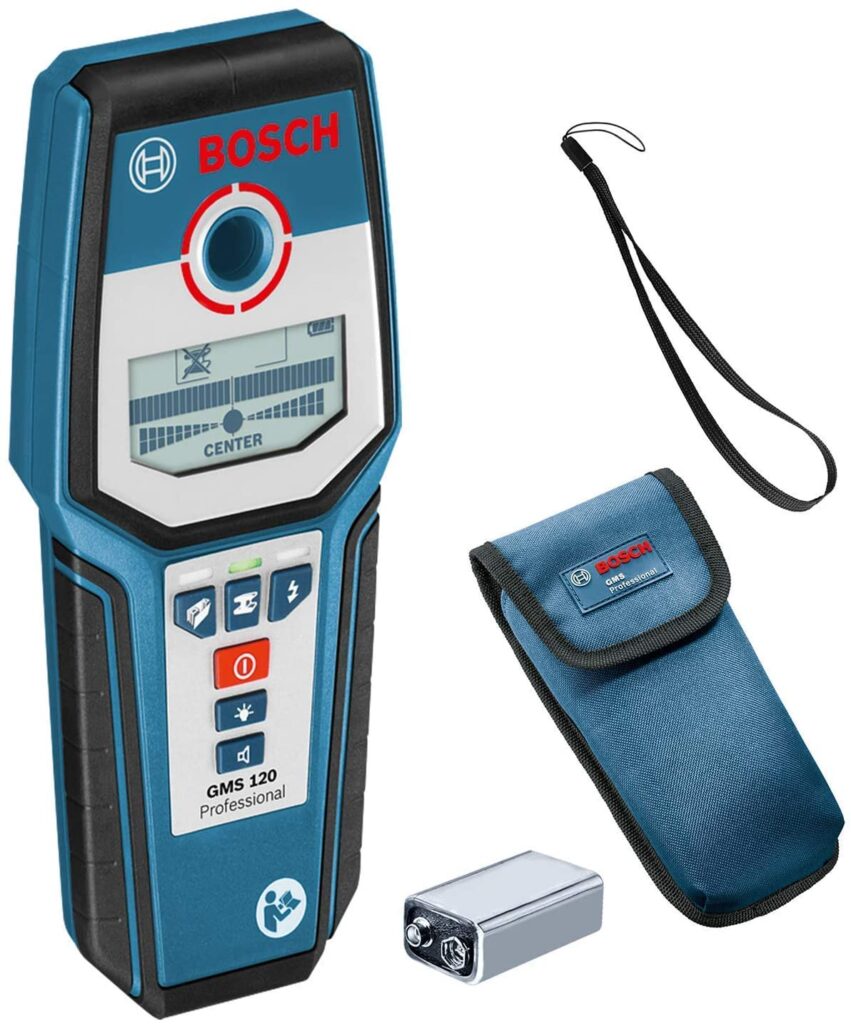
The top stud finder on my list is the Bosch GMS120 for its easy-to-read display and handy design. It's one of the Best Stud Finder UK.
- It has a plastic body with six control buttons on the front side that also houses a circular shaped port with four LEDs placed on its perimeter.
- The LEDs are used to inform you about the objects inside the wall in proximity to the finder so you can put a mark on the wall through the port.
- A port in-between the LEDs helps mark the exact location of the beam or object so you don’t have second thoughts about the location. The LEDs double the scale of indicating the area of the objects inside the wall.
What’s in it for you
As you move the Bosch stud finder around, the LEDs show a faint signal when getting close to the object and it grows stronger as you get closer till you’re right on target. Making it easy for anyone to use.
Key Features
- The Bosch GMS120 is a thick plastic-bodied stud finder, that has a solid and sturdy build.
- It has 4 LED indicators to show the proximity of the stud inside the wall and a port in the centre of the LED lights to help you mark the exact location of the beam or stud.
Related: Check out our list of the Best Solar Decking Lights UK!
#2 -- Tavool Sensor Wall Scanner Electronic Stud Finder
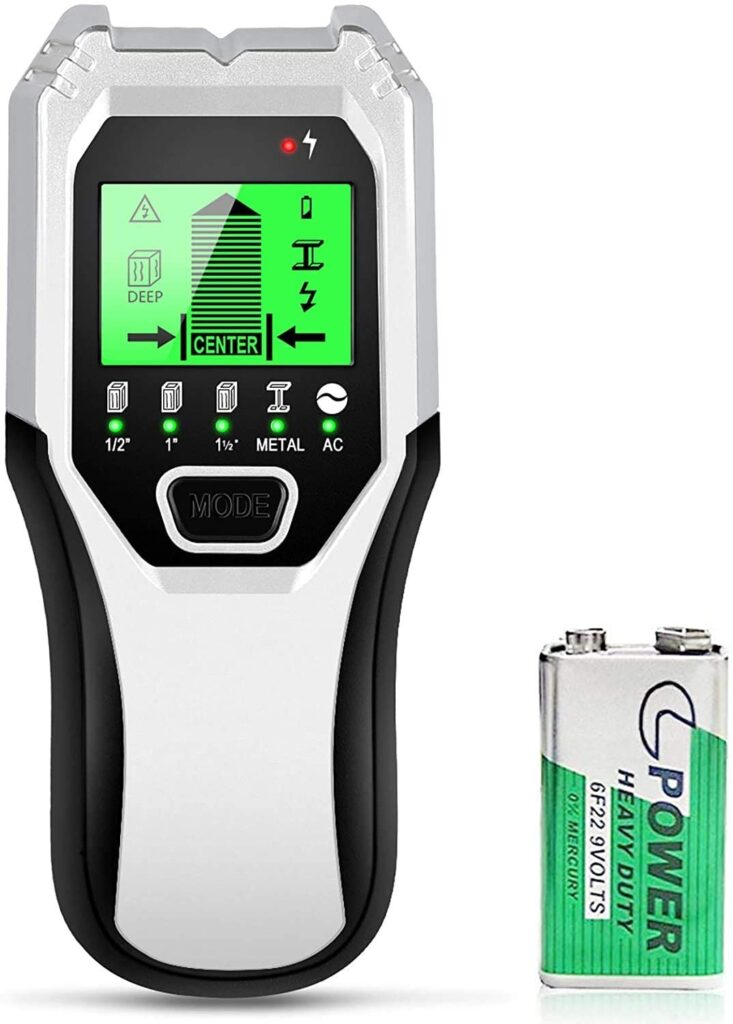
The Tavool Stud finder is excellent at detecting wood and metal studs. It has two depth modes to choose from: the first can detect up to 25mm for surface beams and deep stud mode for detecting support beams up to 38mm thick.
- It is easy to use all you have to do is hold it up against the wall and press the calibration button to do a scan of the selected area. An LCD display clearly shows the details of the scanned area making it easy to mark your points.
- It is easy to use and accurate with its results, it sounds off an audible alarm when getting close to live wires. It's one of the Best Stud Finder UK.
- The two detection modes provided help find exactly what you’re looking for to a depth of 50mm that can be viewed in its LCD display.
What’s in it for you
The Tavool Stud Finder not only allows you to detect beams and studs it can detect live wires running behind the plaster in your wall. Making it easy to avoid work around them.
Key Features
- The Tavool Stud Finder is known for detecting wood and metal studs with precision up to 50mm.
- It has two modes of detection from 25mm to 38mm that also detects live running wires underneath the plaster.
- It has a large LCD display that helps detect all the secrets behind your wall.
#3 -- Proster Stud Finder 4 in 1
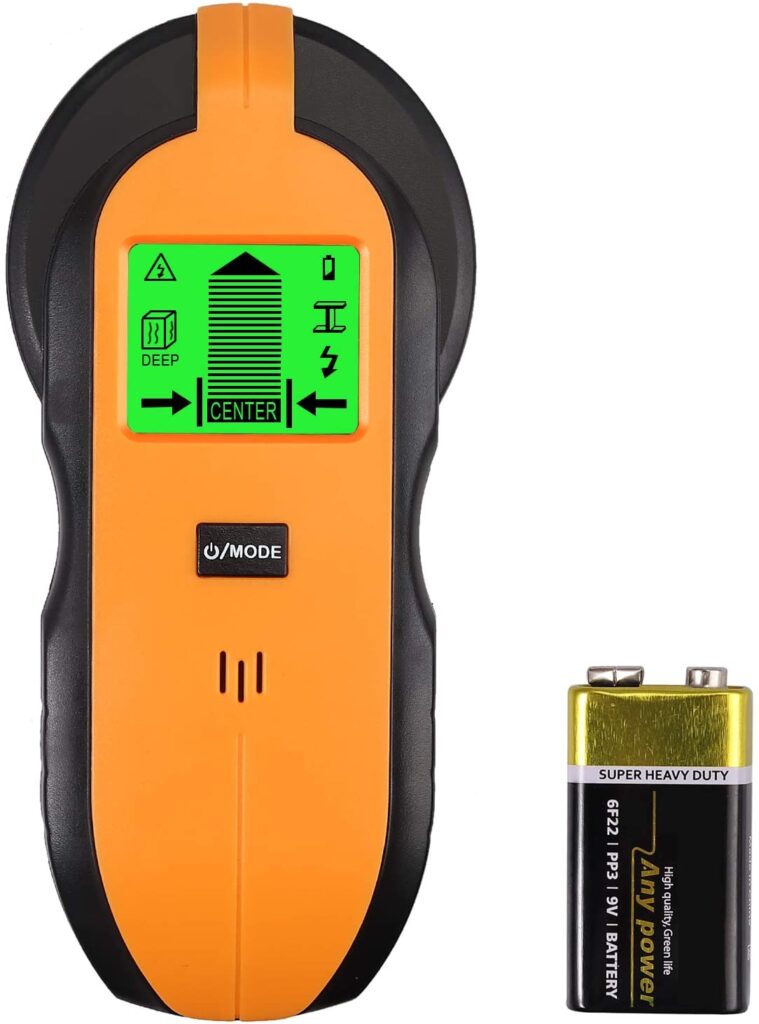
The Proster 4-in-1 Stud Finder can detect wood, wires, and metal accurately behind plasterboard walls. It requires to be calibrated before scanning which is easy to do, just place it against the wall and press the calibration button.
- It works extremely well in detecting cables and pipes amongst the wood, metal, and live wires behind your wall. A clear display shows all the accurate readings making it easy for you to mark the selected area.
- An AC wire is provided to warn you that there is the presence of a live wire. Preventing any mishaps from happening.
- The scanner requires a 9V battery to operate which is provided with the stud finder.
What’s in it for you
The Proster 4-in-1 is easy to use with only three buttons for functionality, just turn on the device, press the device against the wall and press calibrate. When you hear the Beep sound look at the display, it will show you the accurate position of the stud. Making it simple for anyone to use.
Key Features
- The Proster 4-in-1 is known for its easy to use interface and affordable price tag. It's one of the Best Stud Finder UK.
- It can detect both wood and metal. It also can detect live running wires with an AC wire indicator that goes off when you scan the area.
- It has a simple three-button interface making it easy for anyone to use.
#4 -- Tacklife DMS05 4 in 1 Multi-Wall Detector
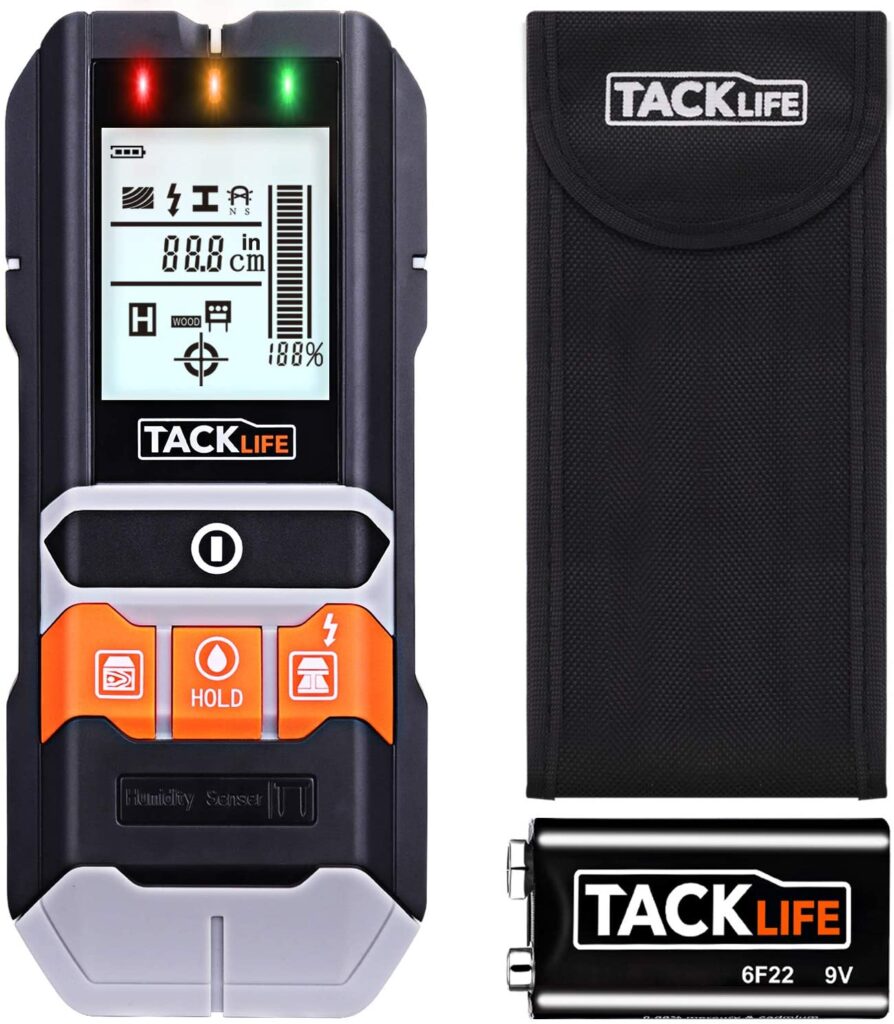
The Tacklife DMS05 4-in-1 is a multi-wall stud detector that can scan in 4 different modes to locate objects. It can scan all objects up to a depth of 38mm, metals up to 120mm, and live wires up to 50mm.
- It is one of the most versatile stud finders as it can detect wood, moisture, metal, and wire.
- Auto-off after a stand-by time of five minutes helps save the battery for long term use without wasting energy.
- A high-quality LCD screen helps read the display from any angle making it easy to find studs in hard-to-reach places.
What’s in it for you
This stud finder offers multiple signals to indicate the object that include three light colours indicator, an audible sound alarm, and signal strength. To make sure you don’t miss the accurate point.
Key Features
- The Tacklife stud finder 4-in-1 is the most versatile finder on my list. It can detect wood, wire, metal, and even moisture in wooden beams up to 120mm deep.
- There isn't much that can escape from the scan of the Tacklife stud finder, it gives you the perfect and accurate indication with three signal indicators so you don’t miss your mark.
#5 -- Franklin Sensors FS710PRO 710+ Franklin
The Franklin Pro sensor 710 is a patent-pending detector that can scan concealed studs in walls almost instantly. It can sense the wall in thirteen locations at the same time then shows the result in the display immediately.
- This is an ideal stud finder for large constructions for quick and accurate results.
- The stud finders unique quick find feature allows you to work efficiently and fast as it removes the need to move from one corner of a wall to another.
- It has a bright LED that lights up to point to the area of the object that allows you to have a clear picture of the location of the studs very easily.
What’s in it for you
The Device can scan accurately even on dense wall surfaces, it incorporates a deep scanning mode that allows you to find studs one and a half-inch underneath a thick brick wall.
Key Features
- The Franklin Pro Sensor 710 is a new age versatile stud finder that can provide results from a scan instantly.
- It scans thirteen locations at a time to pinpoint the exact location of the stud by setting off three indicators making work easy for you.
#6 -- Zircon MultiScanner i520
The Zircon multi scanner i520 can detect studs, metal, and live electrical wiring with its four modes of detection. If you’re looking for an affordable option for your own personal home facelift. This stud finder will help you find the support.
- It can scan studs to find the center of the stud from up to ¾ of an inch deep to 3 inches and can also locate live shielded wires up to 2 inches deep making it a value for money product.
- A Backlit LED display helps view the results from any angle as well as in the dark.
- The stud finder comes with auto-correction technology which enables it to recalibrate itself when a problem is found.
What’s in it for you
It has wire warning detection to alert you that there is a presence of a live AC in the stud or metal beam by flashing continuously for your safety.
Key Features
- The Zircon multi scanner i520 is an all-rounder affordable option that can detect studs and metals up to 3 inches.
- It has a flashing light system to indicate the presence of a beam or wire that shows its result from a backlight LED display.
#7 -- Bosch Professional Wall Scanner D-tect 150
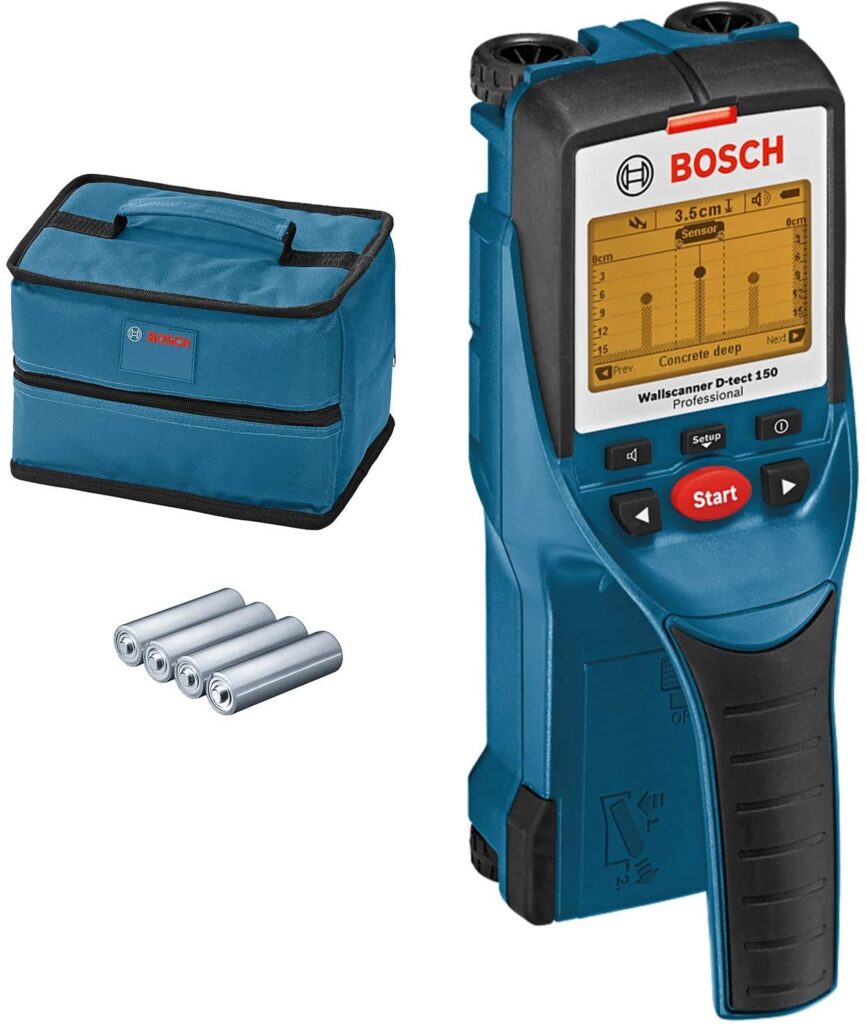
This is by far the most accurate and professional stud finder on my list from bosch. It has five detection settings that allow you to scan almost any wall. It uses radar sensors that are able to pick up non-magnetic/magnetic materials, pipes with or without water, and wires.
- It is excellent for drilling as it comes with a depth indicator that helps the user know how deep the drill bit should go. If you’re looking for a professional stud finder to last long without a doubt this one stands out.
- It has a backlit high-quality LCD screen and a handle to make it easy to manoeuvre and carry.
- You will be able to find a wide range of materials easily making it useful in different professional settings.
What’s in it for you
It is the only stud indicator in its range that comes with a depth indicator that makes it super easy to drill into walls without the worry of hitting a pipe or live wire.
Key Features
- The Bosch D-tect 150 is the answer to a professional stud finder that can scan through almost any wall.
- It uses radar sensors that are able to locate materials that can be viewed from a backlit LCD display.
- It has a handle to help you carry and manoeuvre through hard to scan places.
#8 -- Zircon i700 Multi-Scanner
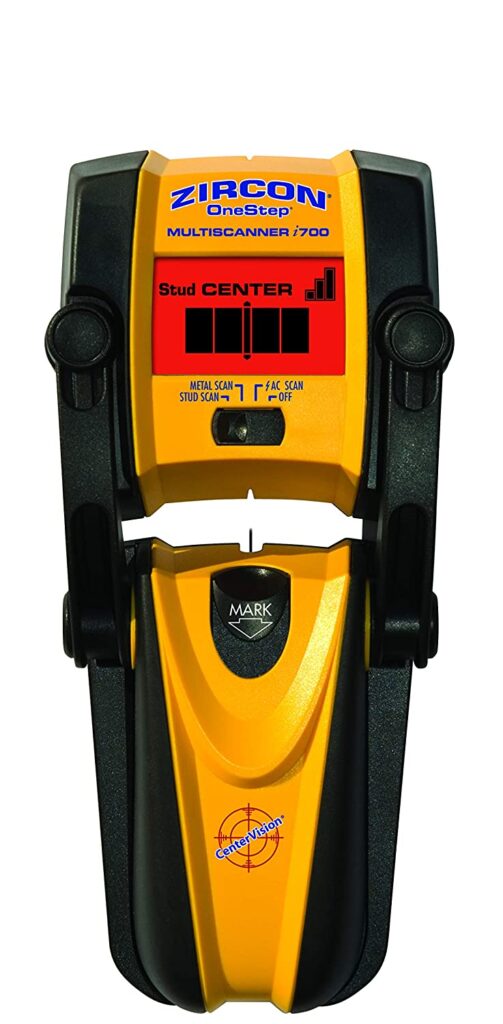
The Zircon i700 is the elder brother of the i520 it has a sturdier build and has a high-quality scanner making it reliable by most. It can identify various materials in seconds such as wood, metal, and AC wiring.
- It is easy to calibrate and use and is easy to mark the exact point with its inbuilt maker.
- It can effectively find metal or wooden studs up to 1.5” in depth making it helpful to know drill bit length.
- It can detect the edges and the centre of the studs making it easy to drill supports to the beam or pillar.
What’s in it for you
It comes with an inbuilt marker that comes in real handy when you don’t have a marker handy to mark the exact location of the object.
Key Features
- The Zircon i700 Multiscanner is the professional model of the i520, that can detect wooden and metal studs up to 1.5” inches.
- It has a LED-backlit display to view results and indicators to provide you with the exact location and point of the stud that you can mark with its in-built marker.
- If you are looking for an alternative to the Bosch d-tect 150 this is ideal for you.
Folai Stud Finder
Folai Stud finder is known to be the most accurate and higher safety device designed with advanced sensor technology used to locate the metal pipes, fire lines, studs and other lines easily.
- This device is also very easy to operate and can scan upto 60 MM in depth. Folai stud finder also has multi-functions and high sensitivity while scanning the extra layers of wallboard.
- Folai stud finder also has a wire warning indicator. This feature alerts you if there’s any unshielded electronic AC wire that can possibly lead to damage.
- It has a very easy to read LCD display and the markings are also very precise.
Key Features:
- Easy to use
- Multi-function
- High sensitivity
- Wire warning indicator
What do you need to consider before investing in a stud finder?
Before you spend a hundred pounds on a stud finder, you need to consider two things: Stud Material and Stud Location. Unfortunately, if you get any of these two factors wrong, you're going to end up losing money.
Material
- Studs can vary in material. For example, while wooden studs are the most common in houses and apartments, you can also find metal and even plastic studs. As a majority of the stud finders are calibrated to find one type of stud. You should make sure to invest in a stud finder that can find all types of studs.
Location
- The location of the stud is equally important as well. If it's hidden behind thick walls then you need to get the type of stud finder that can find studs beyond a certain distance. In fact, it's better that you invest in the most powerful kind of stud finder. Check out our list of the Best Stud Finder UK.
How we tested the stud finder?
To test how well a stud finder works, we constructed a wall with materials: wood and metal studs; drywall; copper, black, pex, and PVC pipe; and nonmetallic sheathed cable. We then scanned the walls with different stud finders that we were testing.
All of the stud finders did a great job of detection but some of them couldn’t locate live AC wiring. After checking the product’s engineers, it was found that steel studs, metal pipe, and ductwork impaired live wiring.
We tested again by removing steel studs and metal pipings. All the stud finders did a better job this time.
Is there a stud finder that actually works?
Bosch's stud finder actually works and it happens to be on the best. This accurate piece of machinery can detect stud regardless of dept. It will indicate the user with it's LED lights, making it different from the majority of the other stud finders. Check out our list of the Best Stud Finder UK.
Tips For Stud Finding:
- To avoid reading alterations, don’t touch the wall with your hands. Stay away while taking the readings.
- It can be difficult to scan fresh painted walls for 2-3 weeks due to moisture content in paint so avoid scanning during that time.
- You can stick painter’s tape on the area you want to scan so that you don’t have to write on the wall.
- Don’t forget to mark studs, wires, objects on the wall when you’re trying to find them.
- If you find a stud, make sure to scan above and below it to check if it continues in the floor ceiling.
- Some tools require calibration before getting scanned so it’s better to start from the switches, outlets or light fixtures.
Can stud finders be wrong?
Do stud finders work on concrete walls?
Do stud finders work through ceramic tile?
Will an electronic stud finder work on lath and plaster walls?
What is AC detection on a stud finder?
Also Read:

